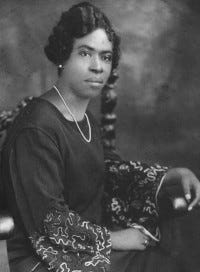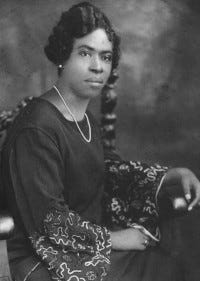Issue #503 Today In Black History, Friday, February 16, 2024
Today’s Black History WOW!
Minnie Geddings Cox, an African American educator and activist, stood up to white supremacy, racism, and Jim Crow laws more than once in the late 19th and early 20th centuries in Mississippi. She was born in 1869 in Mississippi and had a higher lifestyle than most families of former slaves. As business owners, Minnie’s parents were able to send her to Fisk University in Nashville, Tennessee, where she recognized the leadership potential of educated African American women. Geddings graduated from Fisk’s normal school program around 1888, and she moved to Indianola to teach in the new segregated public school. Her future husband, Wayne Wellington Cox, helped establish the school in the early 1880s and served as its principal. The two married in October of 1889.
In 1891, President Benjamin Harrison appointed Cox to the position of postmistress for Holmes County, making her the first African American postmistress in Mississippi. In 1894, President William McKinley appointed Cox as the postmistress of Sunflower County. The Coxes also owned property and had other business and political interests that placed them financially at an “upper middle class” level.
Around 1902, whites in the Mississippi Delta became anxious because of the combination of an economic depression, a power grab by the southern wing of the Republican Party, and an aggressive political contest for governor. White farmers, business owners, and workers suffered financially and resented the success of African Americans like the Coxes and scapegoated African Americans for the reversal in whites’ economic fortunes.
Outnumbered by African Americans two to one, white Indianolans felt it important to send a message to the city’s African American citizens that they should remain “in their place.” Whites from all classes and backgrounds signed petitions urging President Roosevelt to remove Cox from her position as postmistress and replace her with a white man, threatening violence and even death if their demands were not met. Fearing for her safety, Cox sought assistance from the federal government, which ultimately led to President Theodore Roosevelt intervening in the situation.
Roosevelt publicly condemned the threats made against Cox and called for justice and equality for African Americans. His intervention in what became known as the Indianola Affair showcased the racial injustice prevalent at the time and shed light on the challenges faced by African Americans in the South.
On December 4, 1902, Cox tendered her resignation that would take effect on January 1, 1903. President Roosevelt refused to accept it, later stating, “I cannot consent to take the position that the door of hope—the door of opportunity—is to be shut upon any man, no-matter [sic] how worthy, purely on the grounds of race and color.”
However, whites in Arkansas and other nearby Southern states threatened to come to Indianola and kill her. A fearful Cox refused to return to the post office, and it remained closed for much of December. President Roosevelt refused to appoint a new postmaster and reopen the post office. He diverted the mail to nearby Greenville and then Heathman.
The most serious threat to Cox occurred on January, 4, 1903, when she heard noises outside her home. That same evening, a federal postal inspector’s unexpected visit thwarted a would-be lynch mob plotting at the sheriff’s home. The next morning, Cox and her entire family left town.
As much as Cox’s race, education, and economic standing invited the ire of anxious whites experiencing a reversal in their own fortunes, these same characteristics made Cox particularly potent as a symbol of African American achievement.
The Coxes returned to Indianola in February of 1904. Several months later, they opened the Delta Penny Savings Bank. Cox served as the bank’s vice president; after her husband’s death in 1916, she became secretary-treasurer, a position even more powerful than the bank’s president. The second African American-owned bank opened in Mississippi, Delta Penny became the largest and most successful African American-owned bank in the state until it closed in 1928.
In 1908, the Coxes opened an insurance company, Mississippi Life Insurance Company, which became the first African-American-owned insurance company in the United States to offer whole life insurance. Both the bank and the insurance company helped finance homes and other African American businesses throughout the state. It also helped thousands of families build modest wealth.
The Indianola Affair reminded well-to-do African Americans that material success did not guarantee physical security. It actually increased the likelihood that they would become targets of lynching and other forms of extralegal violence as well as continued harassment and exclusion.
The struggle over the tiny post office in Indianola foreshadowed struggles for social justice, economic opportunity, and political power that resonate with present-day challenges that still call out for change. At the time, the Indianola Affair sparked the first major debate about race, states’ rights, and federal power in the United States Congress since Reconstruction.
Minnie Geddings Cox died in 1933, and in 2008, a post office building in Indianola was named the Minnie Cox Post Office Building "in tribute to all that she accomplished by breaking barriers.”
Today In Black History
- In 1923, Bessie Smith recorded her first single, “Down Hearted Blues,” which sold 800,000 copies for Columbia Records.
- In 1923, English archaeologist Howard Carter opened the sealed burial chamber of King Tutankhamen.
- In 1951, the New York City Council passed a bill prohibiting racial discrimination in city-assisted housing developments.
The “Comments” feature has been disabled. Instead, let’s discuss these facts in our community on Substack Notes. You can also read other Substack publications without subscribing to them when you join Notes.
This post is free to read/listen to for three days after publication. To have 365 24/7 access to all our posts and podcast episodes and financially support “We Are Speaking” for no more than $5 per month, please subscribe at the paid level. You will receive a 7-day FREE trial!






